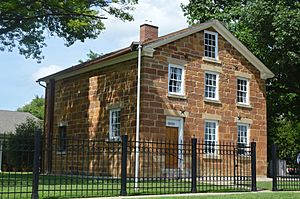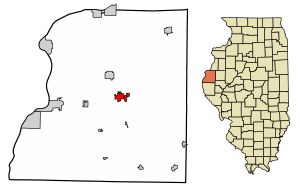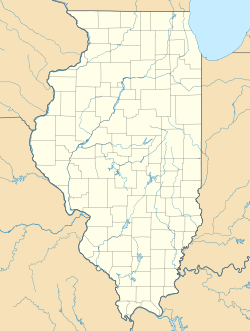Carthage, Illinois facts for kids
Quick facts for kids
Carthage, Illinois
|
|
|---|---|

The historic Carthage Jail, July 2015
|
|

Location of Carthage in Hancock County, Illinois.
|
|
| Country | |
| State | |
| County | Hancock |
| Township | Carthage |
| Founded | 1837 |
| Named for | Carthage |
| Area | |
| • Total | 2.50 sq mi (6.46 km2) |
| • Land | 2.50 sq mi (6.46 km2) |
| • Water | 0.00 sq mi (0.00 km2) |
| Elevation | 656 ft (200 m) |
| Population
(2020)
|
|
| • Total | 2,490 |
| • Density | 997.60/sq mi (385.16/km2) |
| Time zone | UTC-6 (CST) |
| • Summer (DST) | UTC-5 (CDT) |
| ZIP code |
62321
|
| Area code(s) | 217 |
| FIPS code | 17-11527 |
| GNIS feature ID | 2393759 |
Carthage is a city in Hancock County, Illinois, United States. It is also the county seat, which means it's where the main government offices for the county are located. In 2020, about 2,490 people lived there. Carthage is well-known for an important event in 1844 involving Joseph Smith, who started the Latter Day Saint movement.
Contents
History of Carthage
The first European-American settlers came to the area of Carthage and Hancock County in the early 1800s. By 1833, they had built simple homes in Carthage. The town was officially planned out in 1838. Around this time, Carthage was chosen to be the main town for Hancock County.
The Carthage Jail
In June 1844, Joseph Smith, who founded the Latter Day Saint movement, and his brother Hyrum Smith were in the Carthage Jail. Sadly, they were killed by a group of people on June 27, 1844.
Later, on October 22, 1858, Abraham Lincoln visited Carthage. He gave a speech there while he was campaigning to become a senator. A large stone on the south side of the Courthouse square marks the spot where he spoke.
Over the years, the old jail building was changed and used for different things. For a while, it was even home to Carthage College. Today, the jail has been made to look much like it did in 1844. The Church of Jesus Christ of Latter-day Saints now owns it. The entire city block where the jail stands is a historical visitor's center.
Local Heritage
Dr. Alice L. Kibbe, a famous botanist, kind helper, and traveler, lived in Carthage. The Kibbe Hancock Heritage Museum in Carthage has her personal collections. It also shows many exhibits about the history of the local area.
Carthage is special because it's the only city in Illinois that still has all the jails it has ever used.
- The oldest one is called the Mormon Jail.
- The next jail was also the Sheriff's home and is on the south side of the Courthouse square.
- The newest jail is on Highway 136, on the west side of the city.
The Hancock County Courthouse in Carthage was built in 1908. It was the third courthouse for the county. It stands in the middle of the town square. The courthouse and the shops around the square have been listed on the National Register of Historic Places since 1986. This means they are important historical sites.
Geography
Carthage is located at 40°24′52″N 91°8′0″W / 40.41444°N 91.13333°W. The city covers about 2.50 square miles (6.46 square kilometers) of land. There is no water area within the city limits. In 2006, some land on the east side of Carthage was added to the city. This land was about 0.43 square miles (1.11 square kilometers), and it included an eight-acre lake.
Population Information
| Historical population | |||
|---|---|---|---|
| Census | Pop. | %± | |
| 1850 | 400 | — | |
| 1870 | 1,448 | — | |
| 1880 | 1,594 | 10.1% | |
| 1890 | 1,654 | 3.8% | |
| 1900 | 2,104 | 27.2% | |
| 1910 | 2,373 | 12.8% | |
| 1920 | 2,129 | −10.3% | |
| 1930 | 2,240 | 5.2% | |
| 1940 | 2,575 | 15.0% | |
| 1950 | 3,214 | 24.8% | |
| 1960 | 3,325 | 3.5% | |
| 1970 | 3,350 | 0.8% | |
| 1980 | 2,978 | −11.1% | |
| 1990 | 2,657 | −10.8% | |
| 2000 | 2,725 | 2.6% | |
| 2010 | 2,605 | −4.4% | |
| 2020 | 2,490 | −4.4% | |
| U.S. Decennial Census | |||
In 2020, there were 2,490 people living in Carthage. There were 1,157 households, and 694 families. Most of the people living in Carthage were White (91.53%). About 17.7% of the population was under 18 years old.
Economy
Carthage's economy mainly focuses on agriculture and related businesses. The land around the city is used to grow crops, especially corn and soybeans. There are also large hog farms nearby.
A company called Methode Electronics, Inc. has a factory in Carthage that makes car parts. It used to employ many people from the area.
Arts and Culture
The Legacy Theatre in Carthage was updated in 2010. It can now seat 525 people. Many plays and music shows are held there each year.
Education
In August 2007, the Carthage High School building became the new home for Illini West High School. This new school brought together high school students from Carthage, La Harpe, and Dallas City. However, these three cities still have separate schools for elementary and middle school students.
Carl Sandburg College, which is a two-year community college, has a smaller campus in Carthage. It is located on the north side of the city.
From 1870 to 1964, Carthage was home to Carthage College. This college later moved to Kenosha, Wisconsin. Then, from 1965 to 1989, Robert Morris University–Illinois was in Carthage. It later joined with another school and moved to Chicago.
In June 2007, a group bought the old Carthage College campus. Some of the buildings have been fixed up for the Carthage Veterinary Clinic. The auditorium was given to Carl Sandburg College. It has been restored and is used by the college and for community events.
Infrastructure
Healthcare
Memorial Hospital in Carthage opened in 1949. It was named to honor local heroes from World War II. In July 2009, a new, modern hospital facility opened. Memorial Hospital also runs several clinics in the county. These include Midwest Family Medical Care, Women & Family Medical Group, and Convenient Care After-Hours Clinic in Carthage. They also have clinics in Bowen, Nauvoo, and LaHarpe. The main office for Hancock County Emergency Medical Services is also in Carthage.
Notable People
- Orville F. Berry, an Illinois state senator, lawyer, and businessman.
- Virginia Cherrill, an actress who co-starred with Charlie Chaplin in the movie City Lights.
- George Clark, a coach for college and professional football teams.
- Mary Davidson, an Illinois state representative and newspaper editor.
- Beatrice Gray, an actress.
- John Nelson Hyde, a Presbyterian Missionary in India.
- John Mahoney, an actor, is buried in Carthage.
- Leroy A. Ufkes, an Illinois state representative and lawyer.
- Rip Williams, a Major League Baseball player from 1911 to 1918.
- Carthage is the place where Joseph Smith, who founded the Mormon Church, passed away.
See also
 In Spanish: Carthage (Illinois) para niños
In Spanish: Carthage (Illinois) para niños
 | Emma Amos |
 | Edward Mitchell Bannister |
 | Larry D. Alexander |
 | Ernie Barnes |




